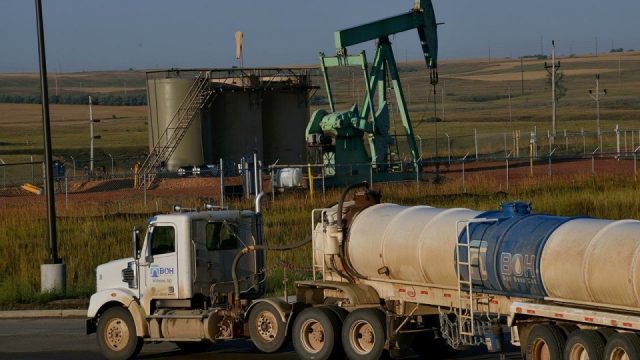The Western Area Water Supply Mess, Or Why The Government Shouldn't Compete With The Private Sector

“A system that brings treated Missouri River water to northwestern North Dakota has experienced a significant drop in industrial water sales as activity has slowed in the oil patch,” reports the Associated Press.
According to the report, “gross monthly industrial water sales through WAWS [Western Area Water Supply] have slipped from a peak of more than $4 million in October 2014 to under $1 million in June.
The WAWS project has always be controversial, particularly with the Independent Water Providers (a group with a self-evident constituency) who say the project puts them directly in competition with the government. Initially the project was sold as meeting rising demands for public water in North Dakota’s oil patch communities, but a big part of paying for the project – which some say was massively overbuilt – relies on selling water to the oil industry. Which, I don’t think I need to tell you, uses a lot of water.
Now that oil activity has dropped off in the western part of the state the demand for water has shrunk. Now it seems the state is trying to protect its share of that market by cracking down on independent water providers.
The state is now discontinuing a program that allowed the independents to sell water for industrial purposes to the oil industry. From the Grand Forks Herald:
The state engineer’s office began allowing irrigation permit holders to sell water to the oil industry in 2011 through the Industrial Water Use in Lieu of Irrigation Policy to meet the high industry demand for water.
But the policy will be discontinued Dec. 31 because the Bakken now has more available water supplies and demand for water has decreased with the slowdown in drilling and fracking, the state engineer’s office announced last month.
The state says the program isn’t needed any more because of the slowdown in oil activity, but given that the state is also in the business of selling water to the oil industry it’s hard not to question their motives.
“They should have let the market decide,” Steve Mortenson, president of the Independent Water Providers, told the Herald.
The oil industry, meanwhile, is concerned about this move diminishing the number of available options for water suppliers. He points out that it puts those oil companies still drilling in North Dakota in a bind, as they may have to make adjustments to where they’re getting water on a relatively short timeline, and Ness points out that fewer water providers will likely mean longer hauls for water which, in turn, means more truck traffic on the roads.
The North Dakota Petroleum Council also is studying how the policy change will affect industry. Ron Ness, president of the industry group, said Wednesday that reducing the number of water sources will mean increased costs and travel for oil companies.
“There’s no question it will cause more truck traffic,” Ness said.
The timing of the decision – announced in mid-October – also gives oil companies little time to adjust their drilling plans, Ness said.
“This has impacts immediately and companies were making big plans around some of these water facilities,” Ness said. “A little more time may be the answer.”
So, in short, this move by the state means less business for private companies. It means a less competitive market for water. It means a less efficient supply of water. It means more traffic on the roads, and more expense and headache for an energy industry already grappling with low prices.
But hey, more business for the state-owned water company, right?
Below is a letter the IWP sent to the State Engineer Todd Sando. They also provided a copy of the letter to me.





